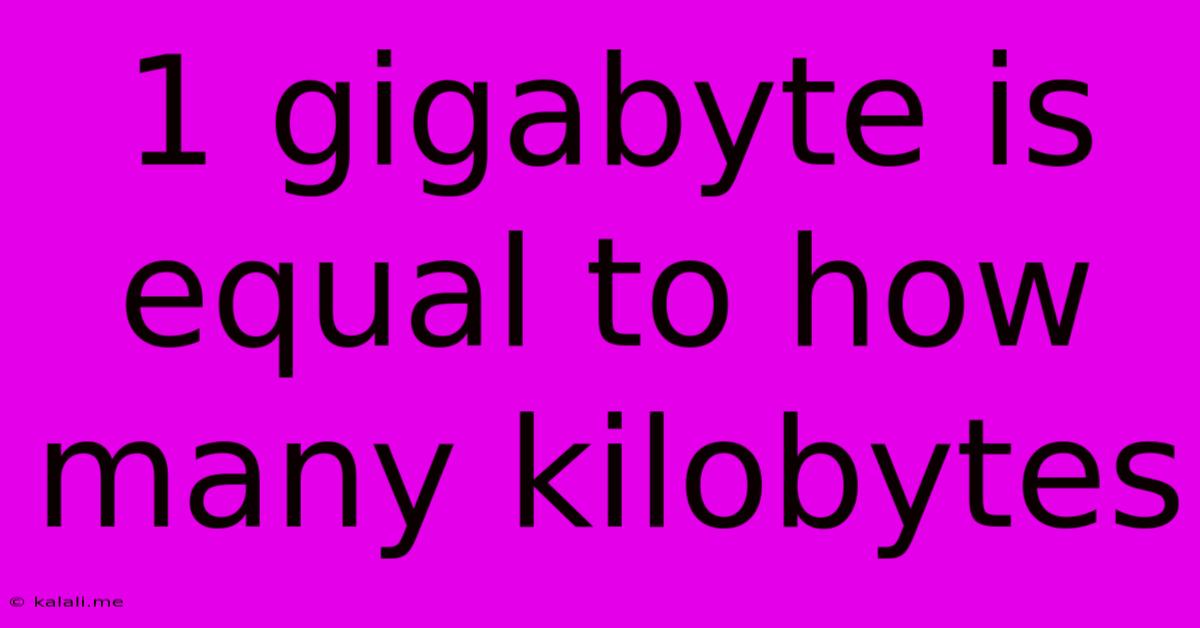1 Gigabyte Is Equal To How Many Kilobytes
Kalali
Jun 13, 2025 · 2 min read

Table of Contents
1 Gigabyte is Equal to How Many Kilobytes? A Deep Dive into Data Measurement
Understanding data storage and measurement is crucial in today's digital world. We constantly encounter terms like kilobytes, megabytes, gigabytes, and terabytes, but sometimes the conversions can be confusing. This article will clearly explain how many kilobytes are in a gigabyte, and delve into the underlying principles of data measurement.
Understanding Data Units: A Quick Refresher
Before we dive into the gigabyte-kilobyte conversion, let's quickly review the standard units of digital data:
- Bit (b): The smallest unit of data, representing a binary digit (0 or 1).
- Byte (B): A group of 8 bits. This is the fundamental unit for measuring digital information.
- Kilobyte (KB): 1,024 bytes (2<sup>10</sup> bytes).
- Megabyte (MB): 1,024 kilobytes (2<sup>20</sup> bytes).
- Gigabyte (GB): 1,024 megabytes (2<sup>30</sup> bytes).
- Terabyte (TB): 1,024 gigabytes (2<sup>40</sup> bytes).
- Petabyte (PB): 1,024 terabytes (2<sup>50</sup> bytes) and so on...
The Key Conversion: Gigabytes to Kilobytes
Now, let's get to the core question: how many kilobytes are in 1 gigabyte?
The answer is 1,048,576 kilobytes.
This is calculated by multiplying the number of kilobytes in a megabyte (1024) by the number of megabytes in a gigabyte (1024): 1024 KB/MB * 1024 MB/GB = 1,048,576 KB/GB
Why 1024 and not 1000?
You might be wondering why we use 1024 instead of 1000. This is because computers work in binary (base-2) system. Powers of 2 are fundamental to computer architecture and memory addressing. While a "kilo" typically represents 1000 in the metric system, in computing, a kilobyte represents 2<sup>10</sup> bytes. This applies to all the other units as well (mega, giga, tera, etc.).
Practical Implications and Everyday Use
Understanding this conversion is important for several reasons:
- File Size Estimation: When downloading large files, you can estimate the download time more accurately by knowing the file size in kilobytes and your download speed.
- Storage Capacity Planning: If you need to store a specific amount of data, you can calculate the required storage space in kilobytes, megabytes, or gigabytes.
- Data Transfer Rates: Network speeds are often measured in kilobytes or megabytes per second. This knowledge helps you understand how long data transfers will take.
- Troubleshooting Computer Issues: If you're facing storage issues or slow data transfer rates, understanding data units helps you diagnose and troubleshoot these problems effectively.
In Conclusion
One gigabyte is equal to 1,048,576 kilobytes. This seemingly simple conversion is a cornerstone of understanding data storage and transfer. By grasping the relationship between different data units, you'll be better equipped to navigate the increasingly digital aspects of our lives. Remember this conversion and the underlying principles, and you'll be well on your way to mastering digital data measurement!
Latest Posts
Latest Posts
-
Lcm Of 6 7 And 9
Jun 14, 2025
-
Can I Change My Sat Date
Jun 14, 2025
-
Oxidation Number Of Cr2 In K2cr2o7
Jun 14, 2025
-
Group Of Words That Express A Complete Idea
Jun 14, 2025
-
An Artesian Well Is One In Which
Jun 14, 2025
Related Post
Thank you for visiting our website which covers about 1 Gigabyte Is Equal To How Many Kilobytes . We hope the information provided has been useful to you. Feel free to contact us if you have any questions or need further assistance. See you next time and don't miss to bookmark.